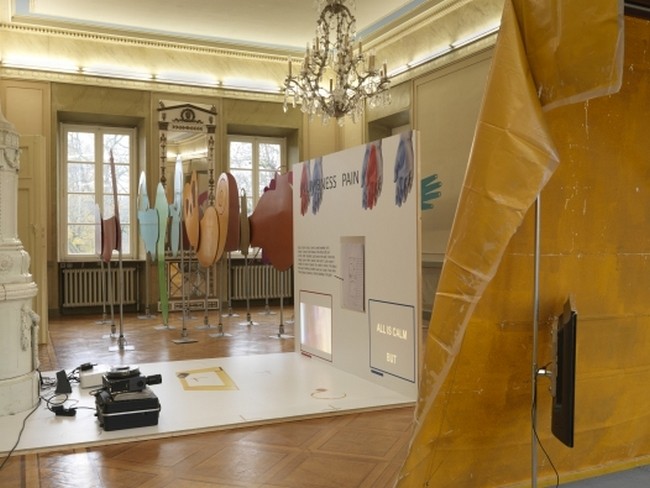Georgia Sagri
02 Dec 2017 - 11 Feb 2018

Georgia Sagri, Documentary of Behavioural Currencies, 2016, Working the No Work (Numbness Pain), 2012/2017, Dynamis, 2017, installation view Kunstverein Braunschweig, 2017, courtesy of the artist, photo: Stathis Mamalakis
GEORGIA SAGRI
2 December 2017 - 11 February 2018
Curator: Christina Lehnert
Curatorial Assistant: Miriam Bettin
The exhibition GEORGIA SAGRI GEORGIA SAGRI goes beyond a display of the artist’s works (b. 1979, Athens, Greece). The sculptures exist for the duration of the exhibition as guests, independent units within the building, without simply adjusting to the space. The exhibition consists of seven large sculptures from the last eight years of Georgia Sagri’s multidisciplinary practice. Some are manifested or announced with the dispersed looking like outdoor signs, destabilizing the sense of reading not only as knowledge, but also as declaration.
Thus, the installation draws on the movements posited in the floor plan of the 1808 neoclassical Villa Salve Hospes: the structure of the characteristically Palladian architectural spaces allows for unobstructed sight lines. Upon entering the building, the visitor is afforded a view of the garden and the side wings; the rotunda suggests circular movement; and the lines of sight emphasize the proportional symmetry of the building’s left and right wings. This harmoniously designed spatial structure is put into question in Sagri’s sculptures, which appear doubled. Some of the works are placed along the vertical axis (Working the No Work, 2012), while others are positioned directly across from each other (Documentary of Behavioural Currencies, 2016). A few are placed on the interior and exterior (Dynamis, 2017), continuing the consistency of Sagri’s work, that contemplates strategies regarding blurring dichotomies.
Sagri also describes her sculptures as “modules”. For her “module” conveys the idea of the conceived possibilities of an object’s multiple meanings in space and space’s impact on an object. In rejecting the singular, she as well rejects the hierarchies between objects and their spatial determinations. The sculptures themselves become sites, allowing visitors to consider them, their perception, and their existence. In response to the question of what constitutes the attributes of and relations between things and spaces, Sagri uses sculptural material, its inherent information, and sculptural form to create a quasi-materialized thought experiment. Thought experiments are a means of grappling with propositions, arguing in favor of or against them. Georgia Sagri thus approaches the question of privacy and publicness, for example, as a matter of interiority and exteriority by reflecting these situations in the sculptural form of a wall and its spaces in between (Snout is Wall and Wall is Snout, 2014).
Sagri’s ongoing engagement with the medium of performance allows mimesis, i.e., how the body of one approaches another different to it, by the act of doubling rather than using language. The sculptures displayed at the Kunstverein Braunschweig may also claim performance as a medium through allowing multiple perceptions of viewership. While retaining their freedom to exist autonomously, they invite the viewers’ movements and decisions of how the sculptures could be viewed. The sculptures are their own interior and exterior spaces creating complete situations through their materiality and form. The idea determines the organization that Georgia Sagri’s sculptures always require for the works to become self-sustained material and formal coding.
The Logo (Loquimini, 2017) emerged as the exhibition’s communication device. It appears on the building’s exterior, on street advertisements, and in the press. It consists of suggested movements, collaged from strips of a Greek daily newspaper’s report on the September 2017 German elections. Time—contemporaneity—and movement come together as four dimensions, suggested in the strips of newspaper and reflected in the dynamics of the works at the Villa Salve Hospes.
Georgia Sagri (b. 1979, Athens, Greece) lives and works in Athens. She studied at the Athens School of Fine Arts in Athens and Columbia University in New York. Her works have been shown in numerous international exhibitions, such as: documenta 14, Kassel and Athens (2017); Manifesta 11, Zürich (2016); at the Sculpture Center, New York (2015); at KW Institute for Contemporary Art, Berlin (2015); at the Museum for Modern Art, Warsaw (2014 and 2015), at Kunsthalle Basel (2014), as well as the 14th Istanbul Biennale (2015), the Lyon Biennale (2013), and the Whitney Biennale, New York (2012). In 2014 she founded the Audio-Magazine FORTÉ as well as the curatorial project SALOON, and initiated the project space 'ΥΛΗ[matter]HYLE in Athens.
GÄSTEZIMMER: Thanos Stathopoulos
Invited by Georgia Sagri, the Greek poet Thanos Stathopoulos (b. 1963, Athens, GR) presents poems of his not yet published volume of poetry The Hour. The guest room becomes a platform for presentation of the so far internationally unknown oeuvre.
2 December 2017 - 11 February 2018
Curator: Christina Lehnert
Curatorial Assistant: Miriam Bettin
The exhibition GEORGIA SAGRI GEORGIA SAGRI goes beyond a display of the artist’s works (b. 1979, Athens, Greece). The sculptures exist for the duration of the exhibition as guests, independent units within the building, without simply adjusting to the space. The exhibition consists of seven large sculptures from the last eight years of Georgia Sagri’s multidisciplinary practice. Some are manifested or announced with the dispersed looking like outdoor signs, destabilizing the sense of reading not only as knowledge, but also as declaration.
Thus, the installation draws on the movements posited in the floor plan of the 1808 neoclassical Villa Salve Hospes: the structure of the characteristically Palladian architectural spaces allows for unobstructed sight lines. Upon entering the building, the visitor is afforded a view of the garden and the side wings; the rotunda suggests circular movement; and the lines of sight emphasize the proportional symmetry of the building’s left and right wings. This harmoniously designed spatial structure is put into question in Sagri’s sculptures, which appear doubled. Some of the works are placed along the vertical axis (Working the No Work, 2012), while others are positioned directly across from each other (Documentary of Behavioural Currencies, 2016). A few are placed on the interior and exterior (Dynamis, 2017), continuing the consistency of Sagri’s work, that contemplates strategies regarding blurring dichotomies.
Sagri also describes her sculptures as “modules”. For her “module” conveys the idea of the conceived possibilities of an object’s multiple meanings in space and space’s impact on an object. In rejecting the singular, she as well rejects the hierarchies between objects and their spatial determinations. The sculptures themselves become sites, allowing visitors to consider them, their perception, and their existence. In response to the question of what constitutes the attributes of and relations between things and spaces, Sagri uses sculptural material, its inherent information, and sculptural form to create a quasi-materialized thought experiment. Thought experiments are a means of grappling with propositions, arguing in favor of or against them. Georgia Sagri thus approaches the question of privacy and publicness, for example, as a matter of interiority and exteriority by reflecting these situations in the sculptural form of a wall and its spaces in between (Snout is Wall and Wall is Snout, 2014).
Sagri’s ongoing engagement with the medium of performance allows mimesis, i.e., how the body of one approaches another different to it, by the act of doubling rather than using language. The sculptures displayed at the Kunstverein Braunschweig may also claim performance as a medium through allowing multiple perceptions of viewership. While retaining their freedom to exist autonomously, they invite the viewers’ movements and decisions of how the sculptures could be viewed. The sculptures are their own interior and exterior spaces creating complete situations through their materiality and form. The idea determines the organization that Georgia Sagri’s sculptures always require for the works to become self-sustained material and formal coding.
The Logo (Loquimini, 2017) emerged as the exhibition’s communication device. It appears on the building’s exterior, on street advertisements, and in the press. It consists of suggested movements, collaged from strips of a Greek daily newspaper’s report on the September 2017 German elections. Time—contemporaneity—and movement come together as four dimensions, suggested in the strips of newspaper and reflected in the dynamics of the works at the Villa Salve Hospes.
Georgia Sagri (b. 1979, Athens, Greece) lives and works in Athens. She studied at the Athens School of Fine Arts in Athens and Columbia University in New York. Her works have been shown in numerous international exhibitions, such as: documenta 14, Kassel and Athens (2017); Manifesta 11, Zürich (2016); at the Sculpture Center, New York (2015); at KW Institute for Contemporary Art, Berlin (2015); at the Museum for Modern Art, Warsaw (2014 and 2015), at Kunsthalle Basel (2014), as well as the 14th Istanbul Biennale (2015), the Lyon Biennale (2013), and the Whitney Biennale, New York (2012). In 2014 she founded the Audio-Magazine FORTÉ as well as the curatorial project SALOON, and initiated the project space 'ΥΛΗ[matter]HYLE in Athens.
GÄSTEZIMMER: Thanos Stathopoulos
Invited by Georgia Sagri, the Greek poet Thanos Stathopoulos (b. 1963, Athens, GR) presents poems of his not yet published volume of poetry The Hour. The guest room becomes a platform for presentation of the so far internationally unknown oeuvre.

